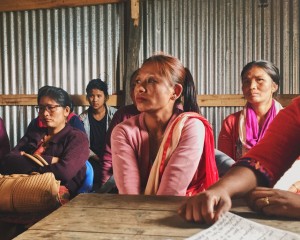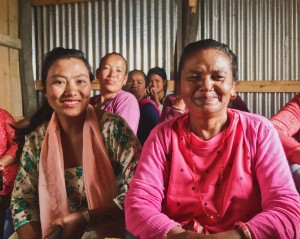A day in the life of a woman in Nepal looks very different from yours or mine. When you and I are peacefully slumbering at 5am, dreaming of the latte that we will pick up on our way to work, or a deadline that is fast approaching, a woman in Nepal has already risen before sunrise to begin her daily tasks. What might these tasks look like? According to Dr. Elizabeth Enslin who has researched the lives of women in Nepal, they may involve milking buffaloes, heating milk, skimming off the cream from the milk, churning butter, making tea, popping corn, sweeping, picking stones from rice and lentils, cutting vegetables, hand grinding spices, cooking the morning meal, washing dishes at the water pump, laundering clothes, weeding vegetable beds, repairing earthen plasters, caring for children, walking long distances to cut and hall grass for livestock (and then carrying the grass back home on their back), cooking lunch, mending family clothes, feeding the buffaloes, shelling peas, cleaning kerosene lanterns, harvesting vegetables, cooking the evening meal, washing the dishes, sweeping and putting children to bed. And this is just the beginning…
The women of Pakhribas municipality explained to me that every day they must start work at 4 or 5am. Since Pakhribas is a farming community, many women experienced a double work burden, carrying out the tasks mentioned above while also having to spend most of their day ploughing fields and cutting/carrying large loads of grass on their back to feed livestock. While men help with work in the field, when it comes to the household responsibilities, women work alone, without support from husbands, brothers or fathers. The women on Pakhribas explained that they face pressure from family members to complete arduous tasks in the field and in the household daily, regardless of their health status. For the women of Nepal, there is no option of taking a “sick day” without serious familial repercussions.
Sobha Magar, age 27, recalls how 1.5 years ago her life was significantly changed by the development of uterine prolapse. While her first and only pregnancy was without complication, she later started to feel her uterus slipping from her body when she lifted heavy loads, squatted to prepare food/ wash clothing etc. Sobha initially concealed her prolapse as she was living with her husband’s family. She sought care in private from an NGO working in the area, but was only given ointment that did little to address her suffering. Sobha has lived with pain and fear every day since developing prolapse. She fears that the next time she picks up a heavy load, her uterus may fall out of her body. She fears that if she reduces her workload, she will be rejected by her family. She fears that if she were to undergo surgical intervention to treat her condition, she may develop other serious health conditions such as cancer.
Today, Sobha is living alone with her daughter while her husband works abroad. She is unable to live with her in laws because of the impact that uterine prolapse has on her life. She fears that if she were to continue to live with her husband’s family, they may treat her poorly because she is unable to work as much as she once did. Sobha feels rejected and alienated because of uterine prolapse, and lost in terms of the next steps she can take to improve her well-being. After we spoke, Sobha began to ask me a plethora of medical questions about her condition. I was unable to provide many answers because I don’t have medical background. A CWN health camp would provide Sobha both with the answers she is seeking, and medical treatment that would significantly improve all aspects of her life.
Pancha Maya Tamang has been experiencing severe uterine prolapse for the past 2 years. The condition developed after she terminated a pregnancy and has significantly impacted her daily activities. Pancha Maya has 3 children, and has experienced problems managing daily work in the field and household tasks after the onset of prolapse. While working, Pancha Maya is always on guard, fearing that her uterus may fall. Thankfully, Pancha Maya’s husband and family members are supportive of her condition and understanding of the challenges of accomplishing daily tasks while suffering from uterine prolapse. Pancha Maya is looking forward to CWN’s next health camp in her municipality, and hopeful that the care she receives may enable her to regain her ability to work, and her overall well-being.
For many of the women of living in Pakhribas, Dhankuta, the next CWN health camp will provide them with the knowledge and care necessary to regain their health, economic and social well-being.
Posted By Rachel Petit (Nepal)
Posted Jul 5th, 2017



